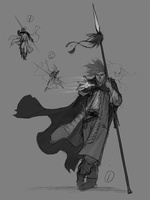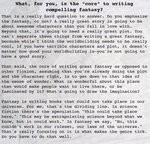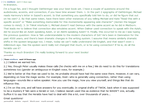Brandon Sanderson
Any of you who haven't read the Evil Librarians series might want to duck out here, because I'm going to talk about the big reveal at the end of the fifth novel. This is a post that's been brewing since 2006, so I'm eager to talk about it—but anyone who has read stories like Secret History will know that I like to brew surprises over the long haul. I'd rather you discover this on your own, by reading the series. I've posted before my pitch on what the books are about, and why you might like them.
For those of you who have read up to the fifth book, it's time to give a behind-the-scenes look at what happened with this series.
If we look back to 2006, we can find the seed of the first [Alcatraz] book in a writing prompt I wrote out for myself: “So there I was, tied to an altar made from outdated encyclopedias, about to be sacrificed to the dark powers by a cult of evil librarians.”
Great first line to a story. I typed it into my phone while at a meeting one day, and quickly became enthralled by it. I'd been reading a lot of middle grade, and wanted to try my hand at something in the genre. I discovery-wrote the story, mostly as a writing exercise—and as a break from the Mistborn series, which I felt needed some breathing room before I could work on the next book.
The story turned out great. Quirky, sarcastic, and fun. So I sent it to my agent, and he liked it too. It took us only a few months to get four offers. Each of the editors we were talking to wanted to know, what was my vision for the series?
And this was tricky because the first book had left me in a bit of a conundrum. You see, a big theme of that first book was a character telling their life's story and warning everyone that he wasn't a hero, that things ended poorly for him. And yet the series was lighthearted and fun, full of humor and wackiness. It didn't have the dark tone of Lemony Snicket, despite the main character's insistence that he was no hero.
I felt I'd promised the audience a fun reversal—that Alcatraz would end up being a hero, even if he didn't think he was one. This was tricky though, because I had the feeling that if I ended it that way, it would be too obvious. Somehow I had to have an ending that justified Alcatraz thinking he was a huge failure in life, but at the same time indicating to the reader that he was actually heroic.
And that's when I hit on a structure that would let me do this. I pitched the following to the various editors interested in the books: I'll write a six-book series that I tell everyone is five books long. The main character will write five, and the fifth will end with the disasters he predicted. This will show exactly why he thinks of himself the way he does.
But then the sixth book will be from the viewpoint of his bodyguard, continuing the story and giving the real ending.
I felt this would work because it played into the themes of Alcatraz being honest about his past, mixed with his feelings of failure. But it would at the same time let us have an ending that wasn't quite so much of a downer. All it required was that we remain quiet for six years or so (it ended up being ten) about the secret sixth book. (In the intervening years, if people asked me if book five was the end, I tried to always answer, "The fifth book is the last one Alcatraz will write.")
Some of the editors loved this idea, and others didn't like it at all. One who loved it was Susan at Tor, who is now publishing the books—so yay!
My initial pitch for the release of book five this year was to have a little envelope inside the back cover that you opened and found a note from Bastille, saying she was going to write the last book. However, that proved to be a problem. First, it's easy to lose a card from an envelope, which meant that library books and secondhand books risked having the true ending get lost. Second, it seemed like it would just be too much for people to resist opening early. We ended up going with a folded-over page at the ending, which at least can't get lost. (And in the ebook, Bastille's note is at the very, very end, past all the footnotes, like a post-credits scene.)
So what does this mean for the future of the series? Well, two years ago I posted a screenshot of my folder showing all of my books in order. It hid a secret project, scribbled out. People assumed this was Secret History, and I didn't disabuse them (as I was working on it at the time). But it's actually Evil Librarians Six, which I've done a bunch of work on. I'm not sure when I'll have it out, but it won't be too long. (I will probably finish it sometime next year.) I'm tentatively calling it Alcatraz Bastille vs. the Evil Librarians: The Worldspire. (Yes, Alcatraz's name will likely be crossed out on the cover, with hers written over it.) Originally I'd named it Alcatraz vs. His Own Dumb Self, but I think that might be going too far.
Thank you to all the fans who have kept with this series over the years. It's because of you that I went through all the trouble of buying the series back from the old publisher, when they decided to end it at four books. And it's because of you that we have the gorgeous new Tor editions, finally with cover art that fits the books. (Not to mention the awesome interior art.)
But book six WILL be the last. You can trust this, because it's me saying it, not Alcatraz.




